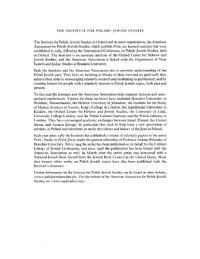
Ebook: Jews and Their Neighbours in Eastern Europe Since 1750
Author: Yiśraʼel Barṭal, Antony Polonsky, Scott Ury (eds.)
- Series: Polin Studies in Polish Jewry
- Year: 2012
- Publisher: Littman Library of Jewish Civilization
- Language: English
- pdf
Relations between Jews and their neighbors in eastern Europe have long been perceived - both in the popular mind and in conventional scholarship - as being in a permanent state of conflict. This book counters that image by exploring long neglected aspects of inter-group interaction and exchange. In so doing, it broadens our understanding of Jewish history and culture, as well as that of eastern Europe. Whereas traditional historiography concentrates on the differences between Jews and non-Jews, the essays in this collection focus on commonalities: the social, political, and economic worlds that members of different groups often shared. Shifting the emphasis in this way allows quite a different picture to emerge. Jews may have been subject to the whims of ruling powers and influenced by broader cultural and political developments, but at the same time they exerted a discernible influence on them - the social, cultural, and political spheres were ones that they not only shared, but that they also helped to create. This model of reciprocal influence and exchange has much to offer to the study of inter-group relations in eastern Europe and beyond. Designed to move the study of east European Jewry beyond the intellectual and academic discourse of difference that has long troubled scholars, this volume contributes to our perception of how members of different groups operate and interact on a multitude of different levels. The various contributions represent a wide cross-section of opinions and approaches - historical, literary, and cultural. Taken together, they move our understanding of east European Jewry from the realm of the mythical to a more rational mode. In addition to essays considering interactions between Jews and Poles, other contributions examine relations between Jews and other ethnic groups (Lithuanians and Russians), discuss negotiations with various governments (Habsburg, Lithuanian, Polish, Russian, and Soviet), analyze exchanges between Jews and different cultural realms (German, Polish, and Russian), and explore how the politics of memory affects contemporary interpretations of these and related phenomena.
Download the book Jews and Their Neighbours in Eastern Europe Since 1750 for free or read online
Continue reading on any device:

Last viewed books
Related books
{related-news}
Comments (0)